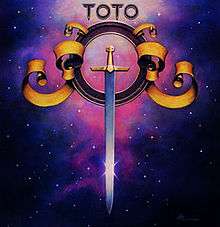Toto (album)
Toto is the first studio album by the American band Toto. It was released in 1978 and includes the hit singles "Hold the Line", "I'll Supply the Love" and "Georgy Porgy", all three of which made it into the top 50 in the USA.[1] "Hold the Line" spent six weeks in the Top 10, and reached number 14 in the UK as well.[2] Although not initially very well received by critics, the band quickly gained a following,[3] and the album gained a reputation for its characteristic sound, mixing soft pop with both synth and hard rock elements. The band would venture deeper into hard rock territory on their next album.
Reception
| Professional ratings |
|---|
| Review scores |
|---|
| Source | Rating |
|---|
| AllMusic |      [3] [3] |
Rolling Stone found Toto's attempt to transition from career session players to a band in their own right a failure, calling David Paich's songs "excuses for back-to-back instrumental solos" and saying that none of the four lead vocalists are better than passable.[4]
In a retrospective review, AllMusic argued that the album received a strongly negative critical reaction only because critics felt threatened by Toto's demonstrated ability to create outstanding songs in any genre, which was a contradiction to popular critical assumptions about genre delineations and inspiration's supremacy over craft. They commented on the irony of the critics' reaction, in that it was this ability that made the album so well-liked by listeners of the time.[3]
Cover art
Philip Garris, well known for painting many Grateful Dead album covers, created the album's emblem after listening to a lyric from the song "Manuela Run" ("You better watch that sword that's hanging over you") which referred to the Sword of Damocles. The sword also represented the band's powerful, hard-edge sound, and, due to their ability to play many types of music, Garris made the sword double-edged to show their versatility. The iron ring represented a piece of work being constructed (the record itself), and the ribbons represented the Year of the Child.[5]
Track listing
All tracks written by David Paich (Copyright Hudmar Publishing), except where noted.
|
|
| 1. | "Girl Goodbye" | Kimball | 6:13 |
| 2. | "Takin' It Back" (Steve Porcaro; Copyright Porcaro Music) | Porcaro | 3:47 |
| 3. | "Rockmaker" | Paich | 3:19 |
| 4. | "Hold the Line" | Kimball | 3:56 |
| 5. | "Angela" | Lukather and Paich | 4:45 |
Singles
Personnel
Toto
Additional musicians
Production
- Arranged & Produced by Toto
- Engineered & Mixed by Tom Knox
- Assistant Engineers: Dana Latham & Gabe Veltri
- Recorded at Sunset Sound (Los Angeles, CA), Studio 55 (Los Angeles, CA) & Davlen Sound Studios (North Hollywood, CA).
- Mastered by Ron Hitchcock & Mike Reese at The Mastering Lab (Los Angeles, CA).
- Cover Art: Philip Garris
- Design & Photography by Ed Careaff Studio.
- Management: The Fitzgerald Hartley Co.
Charts
Weekly charts
|
Year-end charts
Certifications
|
References
- ↑ Toto USA chart history, Billboard.com. Retrieved September 10, 2011.
- ↑ Toto UK chart history, The Official Charts. Retrieved September 10, 2011.
- 1 2 3 Toto at AllMusic
- ↑ Shewey, Don (January 25, 1979). Toto review, Rolling Stone.
- ↑ "Jeff Porcaro Interview about Toto's Sword".
- 1 2 Kent, David (1993). Australian Chart Book 1970–1992. St Ives, NSW: Australian Chart Book. ISBN 0-646-11917-6.
- ↑ Library and Archives Canada. Retrieved August 1, 2012
- ↑ "dutchcharts.nl Toto – Toto" (ASP). Hung Medien (in Dutch). MegaCharts. Retrieved August 1, 2012.
- ↑ Oricon Album Chart Book: Complete Edition 1970-2005. Roppongi, Tokyo: Oricon Entertainment. 2006. ISBN 4-87131-077-9.
- ↑ "charts.org.nz Toto – Toto" (ASP). Hung Medien. Recording Industry Association of New Zealand. Retrieved August 1, 2012.
- ↑ "norwegiancharts.com Toto – Toto" (ASP). Hung Medien. VG-lista. Retrieved August 1, 2012.
- ↑ "swedishcharts.com Toto – Toto" (ASP) (in Swedish). Retrieved August 1, 2012.
- ↑ "Chart Stats - Toto – Toto" (PHP). UK Albums Chart. Retrieved August 1, 2012.
- ↑ "allmusic ((( Toto > Charts & Awards > Billboard Albums )))". allmusic.com. Retrieved August 1, 2012.
- ↑ "Album Search: Toto – Toto" (in German). Media Control. Retrieved August 1, 2012.
- ↑ "RPM Top 100 Albums of 1979". RPM. Retrieved August 1, 2012.
- ↑ "Top Pop Albums of 1979". billboard.biz. December 31, 1979. Retrieved August 1, 2012.
- ↑ "Canadian album certifications – Toto – Toto". Music Canada. Retrieved August 1, 2012.
- ↑ "Gold-/Platin-Datenbank (Toto; 'Toto')" (in German). Bundesverband Musikindustrie. Retrieved August 1, 2012.
- ↑ "American album certifications – Toto – Toto". Recording Industry Association of America. Retrieved August 1, 2012. If necessary, click Advanced, then click Format, then select Album, then click SEARCH
External links
|
|---|
|
|
|
| Studio albums | |
|---|
|
| Live albums | |
|---|
|
| Compilation albums | |
|---|
|
| Soundtracks | |
|---|
|
| Notable songs | |
|---|
|
| Related people | |
|---|
|
| Related articles | |
|---|
|
 Book:Toto Book:Toto |
